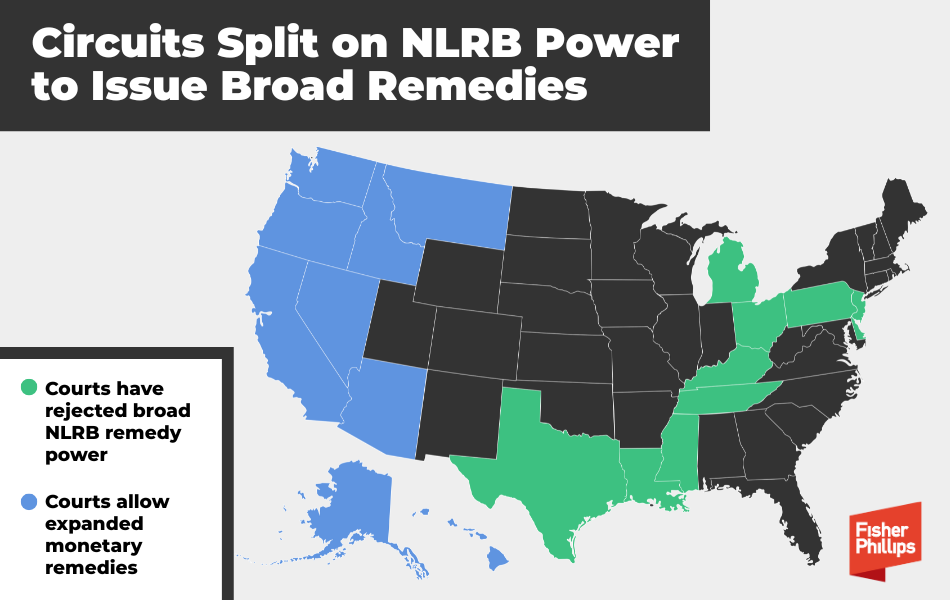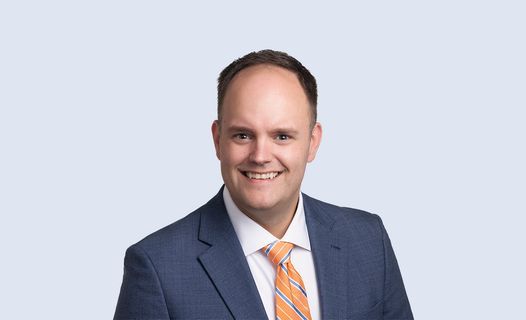A federal appeals court just dealt another blow to the National Labor Relations Board’s effort to expand monetary remedies against employers – and the widening split among federal circuits makes Supreme Court review increasingly likely. In the October 31 Hiran Management v NLRB decision, the 5th Circuit held that the NLRB lacks authority to award damages for “foreseeable pecuniary harms” flowing from alleged labor law violations. The decision means the Board cannot force employers in Texas, Louisiana, and Mississippi to pay for expenses like credit-card interest, missed rent, or childcare costs that workers incur as a result of an employer’s alleged unfair labor practice. This decision follows the 3rd Circuit’s similar ruling late last year, while the 9th Circuit reached the opposite conclusion by upholding the NLRB’s broader authority to award damages. What do (even non-unionized) employers need to know about this decision – and what should you do?
NLRB Awards Employees Damages for All Foreseeable Pecuniary Harms
Hiran Management runs Hungry Like the Wolf, a Houston-based karaoke restaurant with an 80s vibe. After the owner hired a new supervisor, the non-unionized staff complained about extra duties and unkept promises of extra pay.
When tensions boiled over at a staff meeting, several employees walked out – then decided to strike and develop a list of demands. Most stayed off the schedule the next workday. The restaurant’s lawyer later invited them to a meeting to discuss concerns, but the discussions fell apart. A week later, the lawyer notified the striking workers they were no longer employed.
The Biden-era NLRB ruled the employees engaged in protected concerted activity and ordered reinstatement. It also awarded the employees full compensatory damages as a “make-whole” monetary remedy, including repayment for a wide range of “foreseeable” financial harms beyond back pay. The Board relied on its 2022 opinion called Thryv, Inc., which empowered it to compensate workers beyond backpay.
Hiran Management appealed the Board’s decision to the 5th Circuit, which issued a unanimous opinion striking down the NLRB’s authority to issue broad remedies late last week.
5th Circuit Chops Back NLRB’s Power to Award Compensatory, Non-Equitable Damages
The 5th Circuit disagreed with the NLRB’s approach – in emphatic terms. The court opened by underscoring the novelty of what the Board is trying to do:
Ninety years after Congress created the National Labor Relations Board, the NLRB claimed for the first time the ability to award full compensatory damages in its enforcement proceedings. (emphasis added)
Later, the panel explained that although the National Labor Relations Act allows equitable remedies like reinstatement and backpay, it does not authorize broad consequential-damages awards, which constitute legal relief. “The Board’s remedy aims to redress concrete losses to the Employees wholly apart from backpay and pay-related costs,” the court said, “it covers harms typically dealt with in tort suits for compensatory damages, and it operates as a compensatory damages order.”
And the court warned that the NLRB would effectively have no boundaries if it were able to operate under the Thryv standard: “After Thryv, the only limit is the Board’s imagination.” In sum, the 5th Circuit said that only Congress can authorize the Board to award full compensatory damages, and it has not done so.
Why Should Non-Unionized Employers Care?
This opinion isn’t just about union shops. The NLRA protects all non-supervisory employees’ rights to act together over workplace concerns – whether or not a union is involved. In fact, the dispute here started with a walkout by non-union restaurant workers, and the Board still sought expansive financial remedies. That means everyday issues like group complaints, coordinated scheduling protests, or employees teaming up to challenge a policy can be protected under the NLRA and, if not handled correctly, can trigger potential monetary exposure.
If the NLRB’s broadened remedy power stands in some jurisdictions, even routine concerted-activity claims could carry far larger financial stakes, which could result in increased settlement pressure and litigation risks.
Where Courts Stand Now: A Growing Split
Two circuits have now rejected the NLRB’s expanded Thryv remedial scheme:
- 5th Circuit (this case) – covering Texas, Louisiana, and Mississippi
- 3rd Circuit (summary here) – covering Pennsylvania, New Jersey, and Delaware
- [Ed. Note: 6th Circuit – covering Michigan, Ohio, Tennessee, and Kentucky – also rejected broader remedies in a subsequent November 5 decision]
One circuit has allowed the Thryv remedial scheme:
- 9th Circuit – covering California, Nevada, Washington, Oregon, Arizona, Montana, Idaho, Alaska, and Hawaii
What’s Next?
Given this direct circuit split – on a major federal agency power question touching thousands of cases – it seems possible that the Supreme Court could step in to resolve the conflict.
Meanwhile, the NLRB remains in flux. It has been operating without an active quorum since the change in administration, and thus unable to issue decisions or set new legal precedent. While President Trump nominated two new members to the Board back in July, they have yet to be confirmed by the Senate, and the lingering government shutdown makes it difficult to predict when they could be formally installed.
Once the Board resumes operating with a quorum, we expect it to move away from Thryv and stick with its traditional forms of monetary awards (i.e., backpay). We could even see the Board issue an opinion reversing itself on the issue of damage authority. In fact, the new NLRB General Counsel issued a memo in May calling the Thryv standard into question, further signaling a change in philopshy. But Boards will swing back and forth with changes in administration and thus having a definitive word from SCOTUS about the powers of the NLRB in this area would be of massive help to the labor law community.
Practical Takeaways for Employers
✅ Expect legal uncertainty until SCOTUS weighs in
If your company has locations in multiple jurisdictions, remedies may differ depending on where a case lands. Multi-state employers should consider this when negotiating settlements with the Board.
✅ Traditional remedies still apply
The 5th Circuit’s decision does not eliminate reinstatement, backpay, or standard make-whole relief. Those remain firmly in place.
✅ Prepare for NLRB pushback
The Board may likely move away from awarding Thryv remedies, even where courts allow them.
✅ Proactive compliance matters
Avoiding unfair labor practice allegations is still the best defense. Ensure you train your managers and supervisors on:
- Protected concerted activity (including walkouts and complaints)
- Election-related conduct
- Communications during organizing drives
- Discipline issues involving group complaints
Conclusion
Fisher Phillips will continue to monitor this and other labor-related issues and provide updates where necessary, so make sure you are subscribed to Fisher Phillips’ Insight System to receive the most up-to-date information directly in your inbox. If you have any questions, we encourage you to consult your Fisher Phillips attorney, the authors of this Insight, or any member of our Labor Relations Group.




